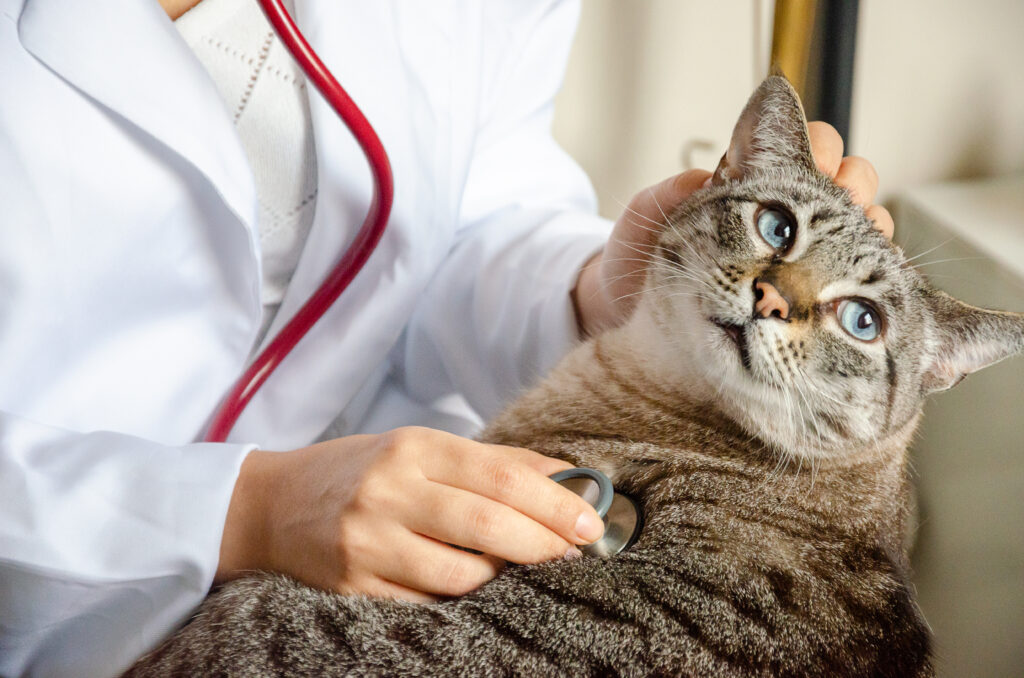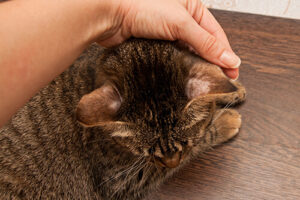At North Jersey Animal Hospital, we know how important your cat’s health is to you, and we want you to be aware of the different health conditions that cats can experience. One such condition is cat hyperthyroidism, a common condition in cats that becomes more prevalent in the middle and senior years. We’ll explore what hyperthyroidism is, the symptoms it causes, and how it can be managed effectively. For more advice or to make an appointment, don’t forget to call us at North Jersey Animal Hospital in Wayne, NJ, at (973) 595-8600.
What is Cat Hyperthyroidism?
Hyperthyroidism is a disorder in which a cat’s thyroid glands, located in the neck, produce excess thyroid hormone. This hormone is responsible for regulating many bodily functions, including metabolism. When too much thyroid hormone circulates in the body, it can cause a variety of health issues.
Causes of Hyperthyroidism
The exact cause of hyperthyroidism in cats is not always clear. It’s suspected that factors such as diet, environment, and genetics may contribute. For instance, certain cat foods, environmental chemicals, or underlying genetic predispositions could be influencing the development of this condition.
Spotting the Symptoms of Cat Hyperthyroidism
To treat and manage cat hyperthyroidism effectively, it’s best to know what symptoms to look out for. These may include:
- Weight Loss: Despite having an increased or normal appetite, affected cats often lose weight.
- Increased Appetite: Many cats with hyperthyroidism feel hungrier and may eat more than usual.
- Increased Thirst and Urination: You might notice your cat drinking and urinating more frequently.
- Hyperactivity: Cats with this condition can appear more active or restless.
- Poor Coat Condition: The quality of your cat’s fur may decline, becoming dull and unkempt.
- Vomiting or Diarrhea: Some cats experience gastrointestinal symptoms.
- Rapid Heart Rate: An increased heart rate is a common sign of hyperthyroidism, which can lead to serious heart problems if untreated.
Diagnosing Hyperthyroidism in Cats
To diagnose hyperthyroidism, your veterinarian will start with a thorough physical examination of your cat, paying close attention to the thyroid glands. Blood tests are also needed to measure the levels of thyroid hormone. In some cases, additional diagnostic methods like ultrasound or nuclear medicine imaging may be recommended to get a more detailed view of the thyroid gland’s condition.
Treatment and Management Options
The good news is that cat hyperthyroidism is treatable, and many cats go on to live normal, healthy lives with proper management.
Medication
Anti-thyroid medications are often the first line of treatment. These drugs work by reducing the production of thyroid hormones in your cat. However, they are not a cure and need to be administered for life. Regular vet visits are required to monitor the effectiveness of the medication and adjust dosages as needed.
Surgery
Cat Thyroidectomy, the surgical removal of thyroid tissue, is another treatment option. It can be a good choice for cats who cannot tolerate medication or have certain types of thyroid tumors. The procedure has a high success rate, but like all surgeries, it comes with risks and requires attentive post-operative care.
Radioactive Iodine Therapy
Considered the gold standard of cat hyperthyroidism treatment, radioactive iodine therapy destroys overactive thyroid tissue without harming other organs. This treatment requires a short hospital stay in a specialized facility and can be curative in many cases.
Ongoing Management
Managing cat hyperthyroidism is a lifelong commitment. Regular exams, blood tests, and close communication with your veterinarian are vital to ensure your cat remains healthy and the treatment remains effective. It’s also important to monitor your cat’s overall behavior and health at home, keeping an eye out for any changes and letting us know if you have concerns.
Let’s Keep Your Cat Healthy Together
If you’re worried that your cat may have hyperthyroidism or if you have any concerns about their health, please contact North Jersey Animal Hospital at (973) 595-8600. Our dedicated team is here to support you and your cat, ensuring they receive the best possible care. Your cat’s health and happiness are our top priorities.





